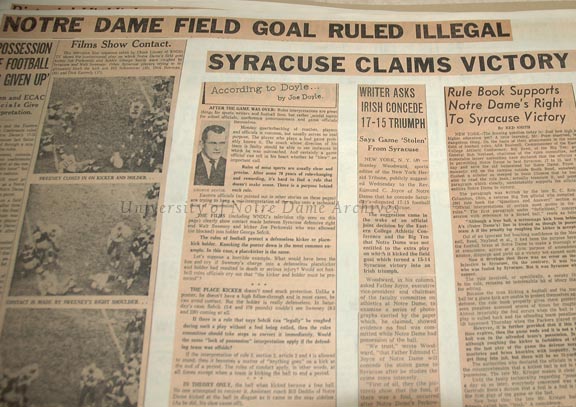
Notre Dame football has sometimes been controversial, and the 1961 game against Syracuse was no exception. When the defense commits a penalty, the offense is usually compensated with a replay of downs and/or gained yardage. However, before this game, the rules were murky regarding how to handle a defensive penalty when time had expired. In the case of the 1961 Syracuse game, this meant the difference between a win and a loss that wouldn’t be resolved for months afterward.

Trailing 14-15 with only a few seconds left on the clock, Notre Dame sent in kicker Joe Perkowski to attempt a 56-yard field goal. He missed soundly as time expired, but there were flags on the field. Syracuse player Walt Sweeney was called for roughing the kicker, a penalty that carried a charge of fifteen yards. The gained yardage would put Perkowski in better position, although it would not be easy. Since time had expired on the previous play, it wasn’t obvious Perkowski would even get a second attempt. The Syracuse fans had already started to rush the field to celebrate their victory.

The officials had to make an on-the-spot decision about how to handle the foul, and they decided to enforce the standard penalty for roughing the kicker. Even though time had expired, Notre Dame kicker Joe Perkowski was given fifteen yards and a second attempt, and he kicked the game-winning, 41-yard field goal.

As can be imagined, not everyone was happy with this impromptu decision. The legality of the extra play was shortly afterwards contested by the Big 10 and Eastern College Athletic Conferences, who supplied the officials for the game, and the NCAA rules chairman General Bob Neyland. Review of the game film and the rules books led many to question the referees’ decisions. Did Walt Sweeney really rough the kicker and place holder? Since the initial kick was far from its target, which team actually had possession when the foul occur? In the end, neither the conferences nor the NCAA had the power to overturn the Irish win, leaving the game officials with the final say and the Irish with a win for the record books. The rules were changed in 1962 to prevent any future confusion should a similar circumstance arise.
Sources:
Scholastic Football Review, 1961
Joe Ceryak Scrapbook, 1961
“Irish Reject Illegal Victory Ruling: Ask Again for Judgment by Full NCAA Committee,” Chicago Daily Tribune, 1961/1129
“Irish-Syracuse Debate May Cause Rule Change for 1962 Grid Season,” Chicago Daily Defender, 1961/1220
“NCAA Rejects Irish Proposal on Officiating,” The Washington Post, Times Herald, 1962/0114
GPHR 45/8420

One thought on “Notre Dame vs. Syracuse, 11/18/1961”
Comments are closed.